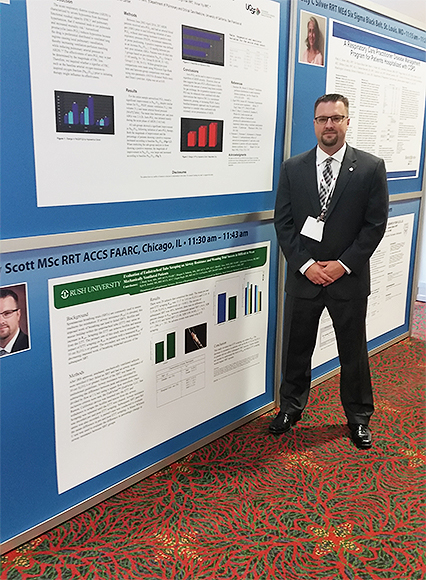
In this edition of our “Open Forum Series,” Brady Scott, MS, RRT-ACCS, FAARC, talks about the abstract that won him a coveted spot in the Editors’ Choice session of the 2016 Open Forum in San Antonio. Scott conducted the study, “Evaluation of Endotracheal Tube Scraping on Airway Resistance and Weaning Trial Success in Difficult to Wean Mechanically Ventilated Patients,” at Rush University in Chicago, IL, where he serves as director of clinical education and assistant professor in the department of cardiopulmonary sciences-division of respiratory care.
Why did you decide to study the evaluation of endotracheal tube scraping on airway resistance and weaning trial success in difficult to wean patients?
We had been using the product for some time to clear endotracheal tubes when obstruction was suspected. We were not sure of the impact that scraping an endotracheal tube would have on airway resistance and overall work of breathing.
Our interest was piqued by the possibility that endotracheal tube scraping could decrease the patient’s airway resistance and work of breathing, and perhaps allow patients to even wean faster. We thought it might also help us measure the patient’s true lung mechanics rather than the interference of an obstructed airway.
Was this your first time conducting a research study? If not how many other studies have you conducted and where have you presented them or had them published?
No, I’ve been involved in several other research projects over the years. I’ve contributed to 19 abstracts either as a primary or co-investigator. I’ve also had the chance to present several of them at places like the AARC’s Open Forum. Recently, one of the abstracts I contributed to was published as a manuscript in the Respiratory Care Educational Annual.
What did you do to gain support from your organization to conduct the study?
I am lucky to be employed by an organization that is very research focused and supportive. In fact, as a faculty member, research is an expectation.
What were the biggest challenges you faced as you carried out the study and how did you overcome them?
As with any study, the design and execution were very challenging. Studies require that you follow protocols closely, document accurately, and conduct the study as approved by the institutional review board. This requires a great deal of planning and attention to detail.
How difficult was it to work the study into your normal job responsibilities and how did you alter your work routine to make it happen? Do you think it was worth the time and effort?
Research, while an expectation, is only a part of my full-time role. At times it was very challenging and even took time from my personal life. We worked on the project after work, on days “off,” and on weekends. We did what it took to complete the project. Luckily, our team worked together to assure the study could be completed in a timely manner and accurately. This was truly a team effort.
How did it feel to learn that your abstract had been accepted to the Open Forum — and most especially, that it was selected for the Editors’ Choice session?
Being selected for the Editors’ Choice session was a career highlight for me. One of my professional goals is to produce meaningful research that will ultimately improve patient care. This felt like a major step forward.
It was a true honor.
How do you think conducting a study like this and having it accepted to the Open Forum is helping to further your career in respiratory care?
It shows dedication to the science of respiratory care, the profession, and our patients. As an academician, it helps me in the promotion process.
What advice do you have for other therapists who might like to follow in your footsteps but just don’t know how to get started?
First, get a mentor. A mentor can help you figure out the initial steps in the research process. Research is complex, so guidance is crucial. I also recommend formal research coursework, through standalone college courses or by enrolling in an advanced degree program. Also, consider the AARC’s Leadership Institute Research Track. Finally, read Respiratory Care. Before someone can produce research, they must know what good research looks like.
Are you planning to conduct more studies in the future? If so, what will you study next and why?
Yes, of course! We have several questions to answer! I am currently involved in simulation education studies and research in the area of respiratory critical care. Hopefully — finger crossed — I’ll have the opportunity to share those findings as well.





